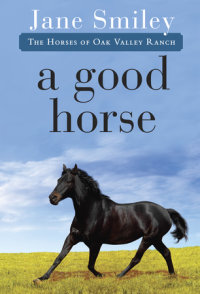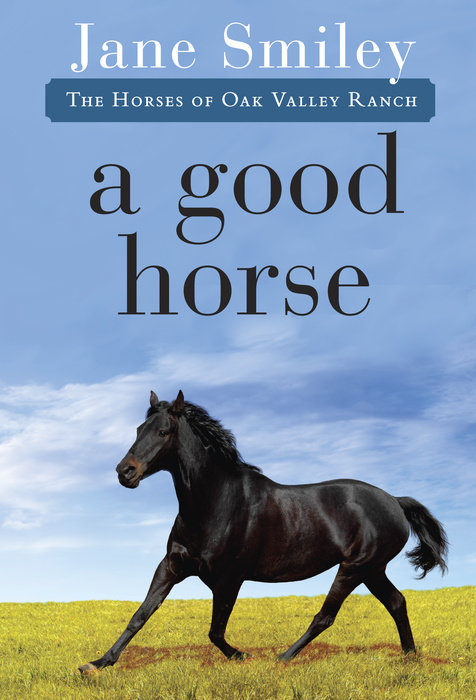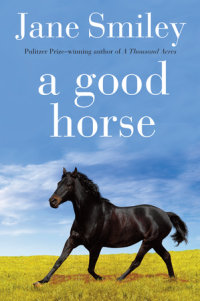A Good Horse
A Good Horse is a part of the The Horses of Oak Valley Ranch collection.
When eighth grader Abby Lovitt looks out at those pure-gold rolling hills, she knows there’s no place she’d rather be than her family’s ranch—even with all the hard work of tending to nine horses. But some chores are no work at all, like grooming young Jack. At eight months, his rough foal coat has shed out, leaving a smooth, rich silk, like chocolate. As for Black George, such a good horse, it turns out he’s a natural jumper. When he and Abby clear four feet easy as pie, heads start to turn at the ring—buyers’ heads—and Abby knows Daddy won’t turn down a good offer.
Then a letter arrives from a private investigator, and suddenly Abby stands to lose not one horse but two. The letter states that Jack’s mare may have been sold to the Lovitts as stolen goods. A mystery unfolds, more surprising than Abby could ever expect. Will she lose her beloved Jack to his rightful owners?
Pulitzer Prize winner Jane Smiley raises horses of her own, and her affection and expertise shine through in this inviting horse novel for young readers, set in 1960s California horse country and featuring characters from The Georges and the Jewels.
An Excerpt fromA Good Horse
Chapter 1
The letter arrived on my birthday. All through elementary school, I was kind of mad that my birthday came so early in the year, September 13, because everyone at school--teachers, students, the ladies in the lunchroom, even the moms--weren't yet thinkingabout cupcakes in class or singing "Happy Birthday" at lunch. As the school year progressed, every birthday got to be a bigger and bigger deal, and by March (when the Goldman twins had their birthday), there were party hats and little favors and a big "HappyBirthday" on the blackboard in colored chalk. On September thirteenth, though, school was too new; no one was tired of it yet, so if Mom sent cookies, sometimes the teacher would forget to hand them out until the end of the day, and then the kids grabbed them,and took them on the school bus, and forgot why they were there. It kind of made me mad and it kind of made me sad. But in junior high, birthdays at school were a thing of the past for everybody. Even so, Gloria and Stella each brought me something: Stella gave me a small stuffed unicorn, and Gloria brought me a book called C. W. Anderson's Complete Book of Horses andHorsemanship. This was a big, expensive book, and I guessed that Gloria's mom had picked it out. No cookies. But the whole setup was different in eighth grade--we went to different classrooms, and not everyone was in all the same classes together. I had English,algebra, and biology with Gloria, and Stella was in our algebra class, and Stella and I had French and social studies. We all had phys ed at the same time, at least until it got cold and we either passed our required swimming tests or gave up on them. Afterthat, Stella said she was going to play basketball--she had been practicing her jump shot all summer. The Big Four had been split up and got mixed around--we didn't even call them the Big Four anymore. It was almost funny to think how they had run the whole seventh grade, and now, three months later, no one paid much attention to them. And so school wasdull. It was all business: "J'ai une soeur et un frere. Mon frere s'appelle Jean et ma soeur s'appelle Annette"; "If A is greater than B, and C is greater D, and D is less than A, then what is the value of B?" "Christopher Columbus was not the first Europeanto discover the western hemisphere. That honor goes to Leif Eriksson, who was a Viking from Iceland, the son of Erik the Red, who discovered Greenland"; and "Even though it looks red, blood consists of red blood cells and white blood cells. These two typesof cells have very different functions." In eighth grade, it was important to take good notes. I had five different notebooks for my classes. (The fifth was for home economics--"All foods are made up of proteins, fats, and starches." The boys took "shop.") And so school was about the same every day, which I didn't mind, because there was so much going on at home, with Black George and Jack and the horses Dad had gotten through Uncle Luke over the summer, that I needed a rest at school, not the sort of restwhere you lie down and sleep but the sort of rest where you know what is going to happen every minute even if it isn't much fun. I saw the letter when I got off the school bus and took the mail out of the mailbox by the road. It was right on top. What caught my eye was not the address: "Mr. Mark Lovitt, Oak Valley Ranch," et cetera, but the return address: "Brandt and Carson Agency,3802 Lovers' Lane Circle, Dallas, Texas." I thought that was such a funny address. And the envelope was nice, too, not like a bill. But I didn't think about it again once I got in the house, because right there, at the kitchen table, was Jem Jarrow, drinkinga glass of water and smiling, and Mom was sitting across from him, grinning and saying, "Abby! Happy birthday, sweetheart!" So I threw down my books and the letters and ran upstairs to put on my jeans and boots, and the three of us went out to find Jack. Thiswas my birthday present! A training session with Jem Jarrow! I hadn't seen him in months, and it was the best birthday present I could have thought of. Jem was smaller than I remembered, walking in front of me, in those boots that looked like they had molded themselves around his feet, with his pale straw Stetson pushed back on his head. But no, probably not. It was me who was bigger--I knew I had grownat least two inches since the spring. I was almost as tall as Mom. What Daddy said about this was, "Once your feet stop growing, then you top out," which always made Mom laugh, but it was a good question. Mom had topped out at five foot three, size-six shoes,but Daddy hadn't topped out until six feet, size ten, same with Danny. And somewhere back there in Oklahoma, where my grandparents and relatives still lived, was Aunt (or Great-aunt) Alice, who had topped out at five-eleven back when most women didn't see five-two."You never know when that might crop up again" was what Daddy said the last time he'd bought me a pair of boots, size seven (but a little too big so they would last through the winter), and even though he was smiling, well, you never did know, did you? Jem was the sort of horse trainer who didn't expect to come back and tell you the same things over and over--he expected you to learn from him how horses' minds worked and then to build on what you'd learned. In the spring, he'd helped me with a very grumpyhorse that I was rather afraid of. My birthday surprise was that we went to the barn rather than to the gelding corral. Right there in the barn beside the chocolate cake on a card table was Daddy holding my eight-month-old colt, Jack. Jack had a red ribbonwith a blue bow looped around his neck, and some more ribbons braided into his forelock, and when he saw me, he whinnied and pricked his ears, and even though I had fed him before going to school that morning and I saw him every single day and he always trottedover to the fence as soon as I approached and stretched his head out for a pat, and then followed me to the gate, and was in every way a kind and affectionate horse, there was something about this whinny and the way he tossed his head to say, "Hey! You're home!I missed you! Let's do something!" that brought tears to my eyes because I was so lucky. So I went up to Daddy and took the lead rope out of his hand and led Jack out of the barn, and he turned in a curve around me and then put his head down so I would pathim along the neck, and then he gave a low nicker, just for me. Jem Jarrow was smiling. He said, "Let's see what this fellow has learned." In addition to helping me with Ornery George (who was now sold), Jem had shown me how to give Jack his first lessons in being a good boy. I led him toward what had once been his pen. It was now the training corral, dusty and tan-colored, because Daddy had brought in a load of sand and the three of us had raked it into the dirt. He had plans for the winter, some way he was going to work thefooting so it would drain perfectly after every rainstorm, but there hadn't been any rain since April, and there probably wouldn't be any until December, so it was no rush. The hills that spread up and away were the purest gold this time of year, creased here and there by streambeds and dotted with oaks, rising to the hard, endless, cloudless blue of the sky. Over to the east, around the crown of Rory's Peak, some of Mr.Jordan's cattle lay under the trees, not stretched out like they were sleeping but heads up and thoughtful, chewing their cud. Mr. Jordan had a huge ranch, and he only put cows in this field around this time of year, to save the grass from getting eaten downto the roots. The cows were beautiful, I thought, a special breed of blue Brahmas, with long ears and quiet expressions. They didn't mind the heat, according to Daddy, not like Angus and even Herefords, who had been bred for cool weather. And they were reallyblue. Once in a while, I liked to ride one of the horses up the hill to the fence line, then get off and pet them through the wire. It was good for the horses to go up and down the hill, and also to get used to the cows, at least a little. I opened the gate and walked through, making sure that Jack was right with me, neither lagging behind (but he never did that) nor pulling me forward. He was good. He stepped through, and when I twitched the rope, he swung around and dropped his head. Iunbuckled the halter. He waited until I waved him off, and then, having been given permission, he trotted away, tail up, ears pricked, neck arched. The four mares in the mares' corral looked up from their hay as if he were something to watch. And he was. Whatever there had been of the baby in Jack was gone now. His rough foal coat had shed out, leaving smooth, rich silk the color of dark chocolate, which shaded into mahogany around his nose and on his belly just in front of his stifle. The black of hislegs ran above the knees, and his tail had started to grow out--it was no longer fluffy and brown but was beginning to be smooth and black. His mane was still sticking up, thin and soft, but his forelock had begun to grow--it even had a cowlick, right in thecenter, and every day when I brushed him, I liked to smooth it together between my fingers. It would hold together for maybe a second, and then the two halves would spring apart again, one half falling toward his left eye and one half falling toward his righteye. His eyes were big and black, "eyes you could knock off with a stick," Daddy said, but he didn't mean that in a bad way--he meant that Jack's eyes were prominent and bright, always looking and always taking things in. Even at eight months old, Jack wasquite a sight, or at least I thought so--long-legged still, but muscular and strong, and big. He trotted across the pen and then swept around and sped up and then crossed in front of me, his neck arched. Then he sprang off his hind legs. Everyone was quietuntil Daddy said in his usual way, "Useless animal, if you ask me," but he said it in a voice that showed that usefulness wasn't everything--sheer gorgeousness was worth something, too. Maybe. Jem Jarrow said, "Usefulness is in the eye of the beholder, I think." He went into the center of the pen with his rope coiled in his right hand and stood there in his normal way, not doing anything, just watching the horse. Then Jack realized that he was free. The first thing he did was rear up, with a little squeal, and stretch his forelegs upward. He stayed like that for what seemed like a long time, and then dropped and galloped across the pen, kicking up and squealing.In the other corner, he turned suddenly toward Jem and reared again, this time looking right at him--not stretching his forelegs out but curling them in, as if to say, Look at me! Look what I can do! But I would never hurt you! He stood up like that, once again,for a long moment, and then actually took a step on his hind legs like a circus horse, and Jem Jarrow laughed. Jack came down and trotted across the pen in front of us, snorting and full of himself. Then Jem lifted the coil of rope and turned his body. Jackwent right to his circle at a fast trot. Jem kept the coil lifted, and Jack flicked his ear toward it, knowing that that meant for him to keep going. After four circuits, Jem lowered the coil and Jack slowed down. When Jem stepped back, Jack stepped under andspun inward, then headed in the other direction. Jem hardly had to lift his rope at all--Jack just kept trotting--arching his neck and sometimes tossing his head. It was a beautiful sight. I felt myself getting mesmerized. And then Jem called out, "He's quick,all right, and proud. But you've done a good job, Miss Abby. He's ready as can be for the next step." That was the best birthday present ever. I said, "What's the next step?" He motioned to me to come to the middle of the pen. When I got there, we stood quietly. After a minute or two, Jack, who had been walking along the side of the pen, turned and walked toward us, his ears pricked. Jem stood quietly, the coil down. When Jackstopped in front of us, looking at us, Jem slipped the coil over his neck. Then we stood there for another few moments. Jack's ears flicked back and forth. Jem slowly, and in a relaxed way, took a few steps along Jack's left side, and then went around behindhim, bringing the rope across below his tail, then he took a step and another step along his right side. Jack was now wrapped in the rope. Jem exerted just a little pressure, Jack flicked his ears and then turned away from Jem and unwound himself. It seemedlike no big deal. It seemed like the natural thing to do. But it wasn't. Lots of horses wouldn't think to unwind themselves; they would panic and pull back or try to pull their legs out and maybe get tangled up. Unwinding himself was just what you wanted ahorse to do. Jem did this again to the left, and then twice to the right, and then he had me hold the rope and do the winding. By the time I was done with two turns in each direction, Jack was hardly letting himself be wound--as soon as he felt the least pressurefrom the rope, he simply followed it, looking at me and waiting for the next thing.


